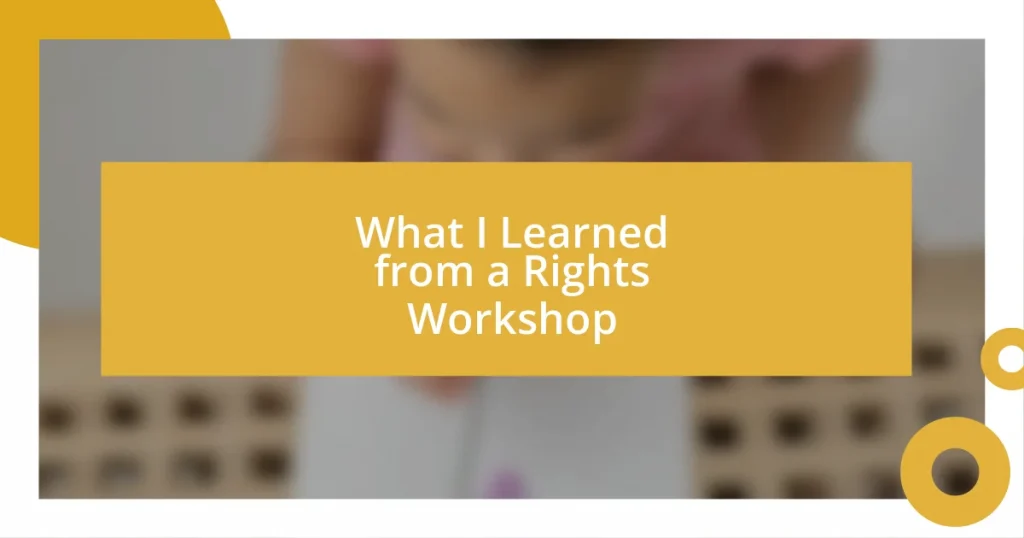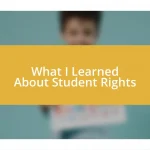Key takeaways:
- Rights workshops foster personal connections and empower participants to advocate for themselves and others through interactive learning experiences.
- Understanding rights is crucial for self-advocacy, community solidarity, and holding those in power accountable, preventing rights violations before they occur.
- Ongoing education and collaboration with like-minded individuals are essential for sustaining advocacy efforts and creating a ripple effect of empowerment within communities.
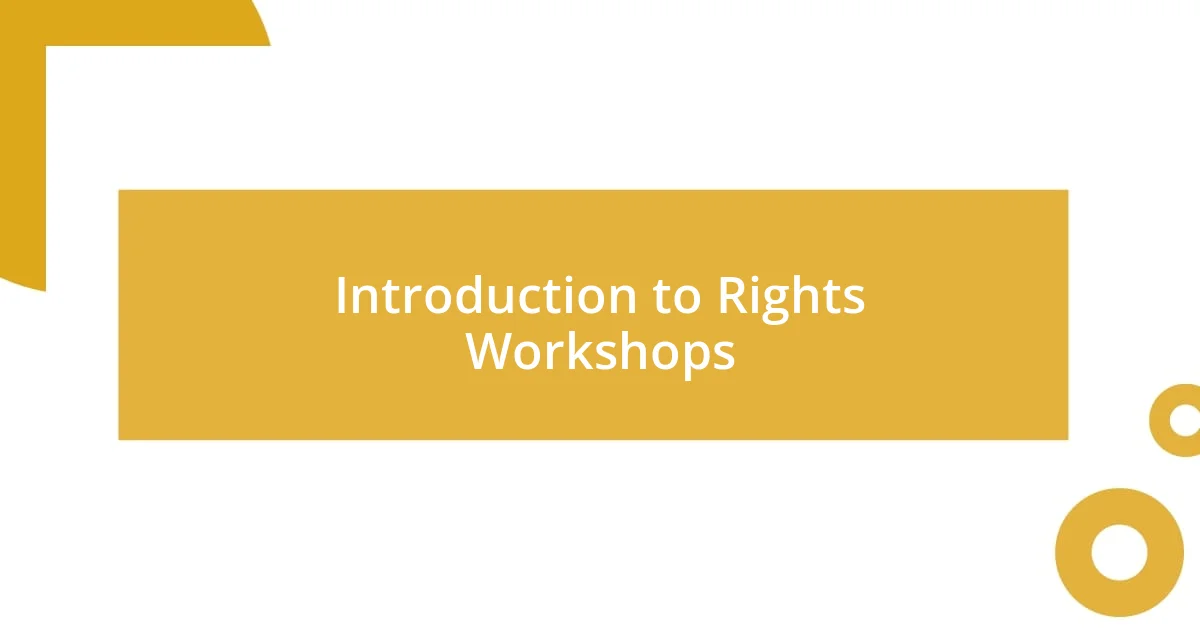
Introduction to Rights Workshops
Rights workshops serve as essential spaces for individuals to explore and understand their rights and the rights of others. I’ve attended several of these workshops, where the atmosphere was both energizing and enlightening. It was incredible to see people come together, eager to learn and share their experiences—don’t you think it’s powerful when we unite for a common cause?
During one particular workshop, I remember sitting across from someone who had faced discrimination in their workplace. Listening to their story made me realize that understanding our rights isn’t just about knowing laws; it’s about personal connections and empathy. Have you ever felt that sense of validation when discussing experiences with others? That’s what rights workshops can do—they provide a platform for dialogue that fosters awareness and support.
Moreover, these workshops often include interactive activities, allowing participants to practice real-life scenarios. I vividly recall role-playing exercises that thrust us into challenging situations. It’s one thing to read about rights, but entirely different to practice asserting them in a safe environment. Such experiences underscored the importance of being informed and confident, and I left feeling empowered—what’s more exhilarating than realizing you have the tools to advocate for yourself and others?
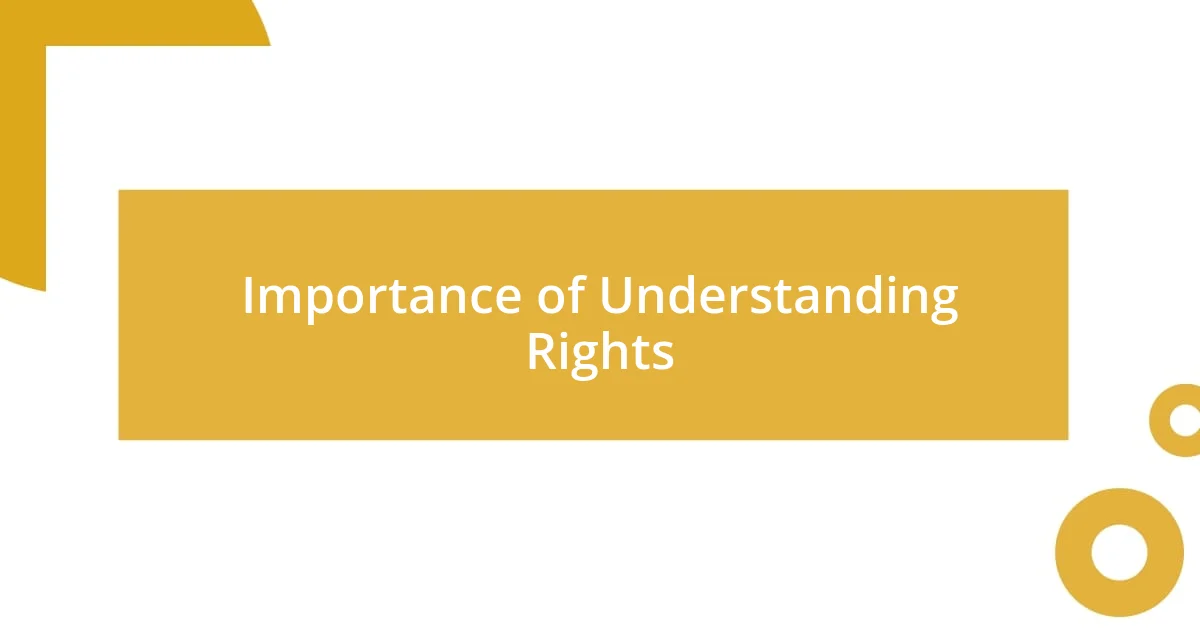
Importance of Understanding Rights
Understanding our rights is crucial, not only for self-advocacy but also for fostering a just society. I remember a time when a close friend faced a housing issue, unsure of her rights as a tenant. It struck me how, without the knowledge gained from workshops, she might have accepted an unfair situation. This experience highlighted how fundamental understanding our rights is for safeguarding our dignity and ensuring accountability.
When we grasp our rights, we can engage in meaningful conversations and support others in their struggles. Here are some key points to consider:
- Awareness: Knowledge of rights empowers individuals to recognize when they are being infringed upon.
- Advocacy: Understanding our rights equips us to advocate not only for ourselves but also for others who may feel powerless.
- Community: A collective understanding strengthens community ties and creates a culture of respect and support.
- Accountability: Knowing our rights holds those in power accountable for their actions, ensuring justice is served.
- Prevention: Awareness can prevent rights violations before they occur, fostering a proactive approach to personal and social issues.
Reflecting on these aspects reminds me of the collective responsibility we all share in promoting a rights-conscious society.
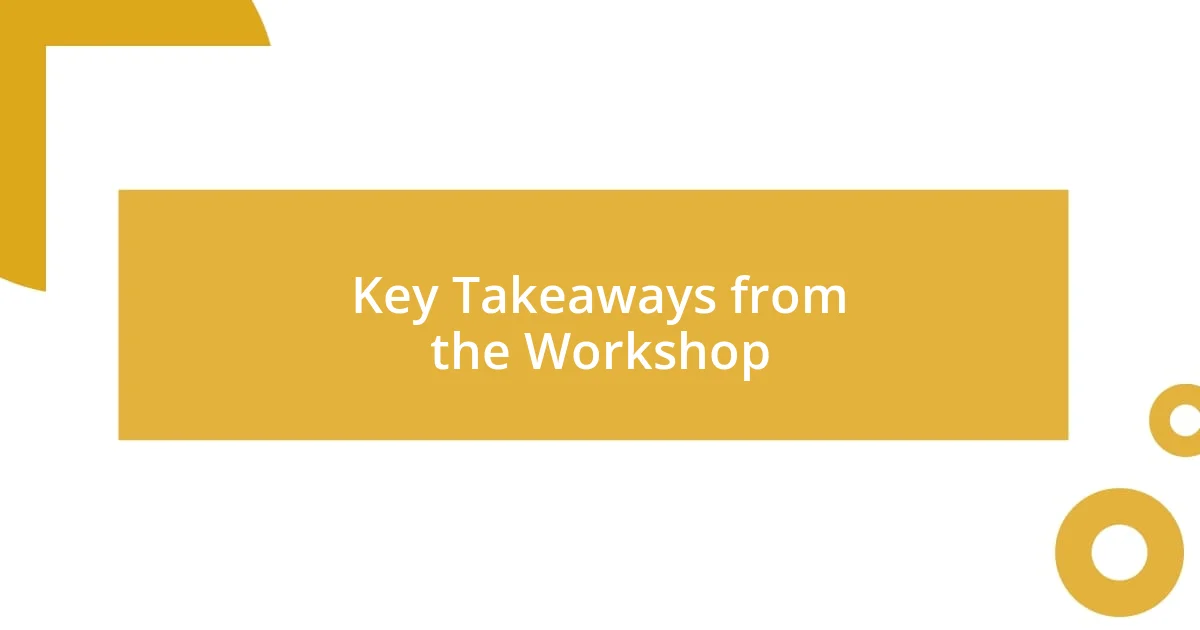
Key Takeaways from the Workshop
Key Takeaways from the Workshop
Participating in the workshop opened my eyes to the importance of interactive learning in understanding rights. I remember a particular incident where we were tasked with identifying our rights while playing a game that mimicked real-life scenarios. It felt so real that I could almost feel the tension in the air. This kind of engagement makes the information stick, don’t you think? It’s not just about lectures; it’s about connecting theory with practice.
Another crucial takeaway for me was the significance of networking with like-minded individuals. During a break, I struck up a conversation with a passionate advocate who shared her journey of fighting for workers’ rights. Her story resonated with me and ignited a spark within. I realized that these connections can be vital in continuing the fight for justice beyond the workshop. Have you ever found inspiration from unexpected conversations? It’s amazing how sharing our journeys can lead to collaborative efforts for a common goal.
Finally, I learned that understanding rights is an ongoing journey. After the workshop, our facilitator encouraged us to take small steps, like sharing what we learned within our communities. I never forgot those words. So, I organized a small gathering in my neighborhood to discuss our rights as citizens. The engagement was fantastic, and seeing others light up with newfound knowledge reaffirmed the ripple effect that workshops can create. It reminded me that while we may start as individuals, together we can build a powerful movement for change.
| Key Insights | Personal Reflections |
|---|---|
| Interactive Learning | Engagement is key to retaining knowledge. |
| Networking Opportunities | Connections can lead to unexpected collaborations. |
| Ongoing Journey | Sharing knowledge empowers communities. |
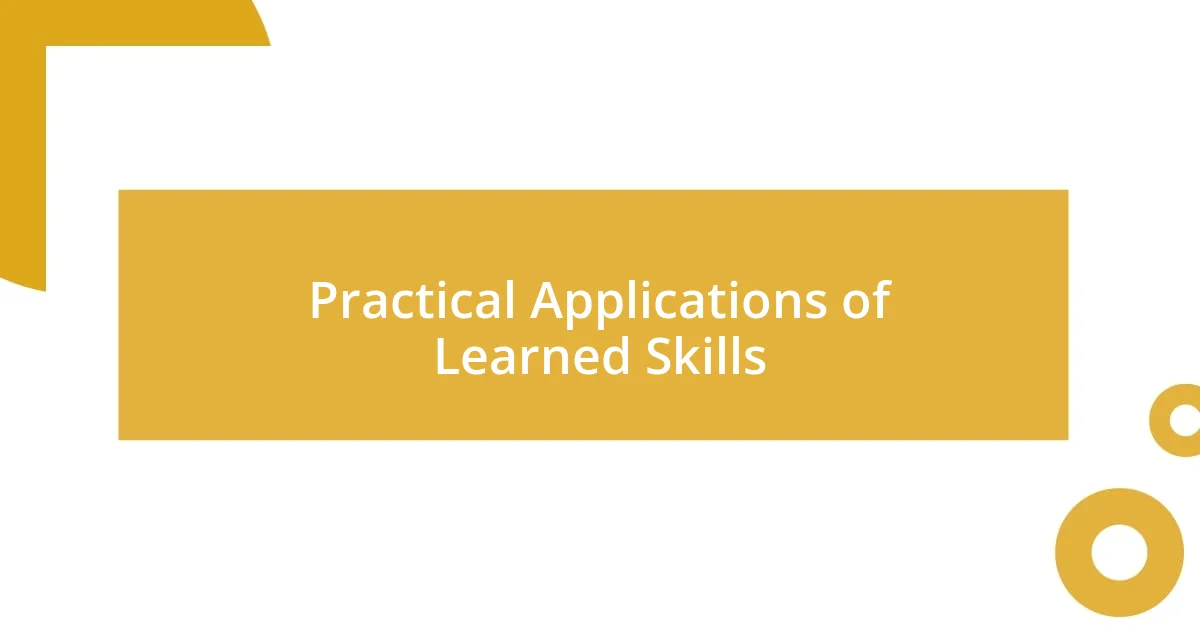
Practical Applications of Learned Skills
As I applied the skills learned from the workshop, I found myself equipped to address real-world issues more effectively. For instance, when a neighbor faced discrimination at work, I immediately stepped in, feeling a sense of responsibility and empowerment. I remember asking him, “Do you know your rights?” It was amazing to see how that simple question opened a dialogue that encouraged him to stand up for himself rather than remain silent.
Another way I utilized my newfound knowledge was during a community meeting where local policies were being discussed. I was nervous at first. However, I gathered my courage and voiced my opinion about a proposed change that infringed on residents’ rights. Reflecting on that moment, I realized how crucial it is to use our voices. Have you ever felt that rush of adrenaline when you advocate for something you believe in? It reshaped how I view civic engagement – it’s not just participation but a way to influence the surrounding community.
Going beyond personal advocacy, I also recognized the importance of educating others. I initiated a small workshop at my workplace to share what I learned. The team was engaged and, surprisingly, had their own stories to share, which enriched our discussion. Witnessing their enthusiasm made me understand that education doesn’t have to be formal. Isn’t it incredible how sharing knowledge can create a ripple effect, inspiring others to learn and advocate for themselves?
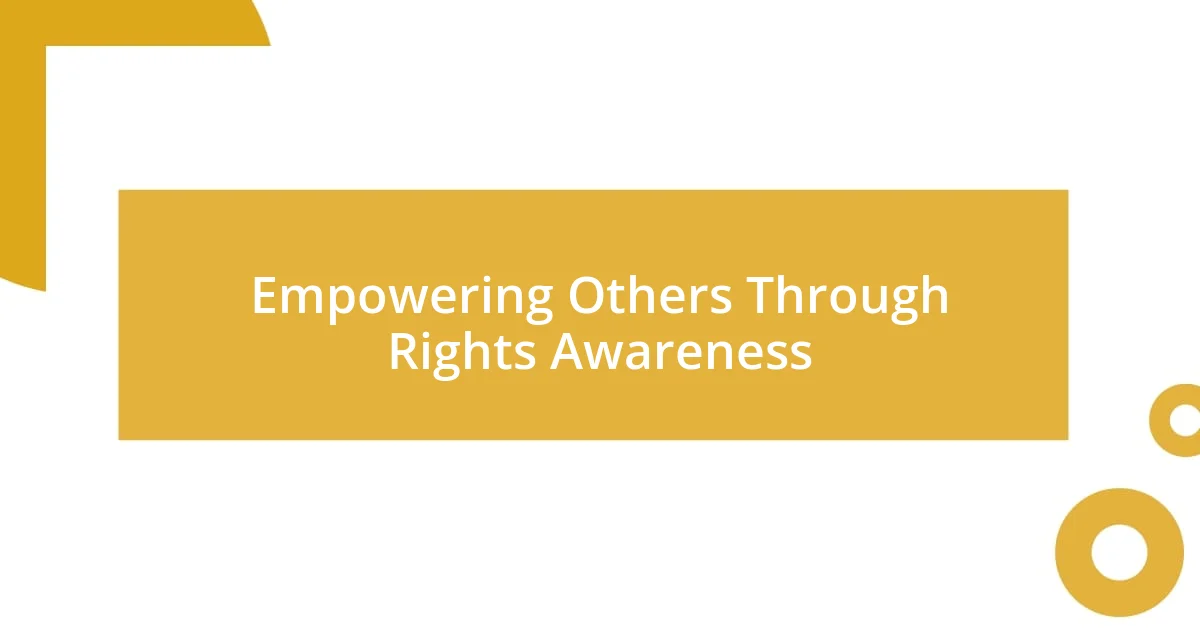
Empowering Others Through Rights Awareness
Empowering others through rights awareness is a deeply fulfilling experience. I recall one afternoon, sitting in a cozy café, discussing civil liberties with a friend who felt uncertain about her own rights. As I shared stories about the victories and struggles of others, I saw her eyes light up with recognition. It’s moments like these that demonstrate how understanding one’s rights can unlock a sense of agency. Have you ever watched someone realize their potential? That feeling of empowerment can transform lives.
In a recent community gathering, I had the chance to facilitate a discussion on social rights. Although I was nervous, I felt a surge of determination as I urged participants to voice their thoughts. Each story shared brought new perspectives, enriching our understanding of collective power. Watching individuals articulate their experiences made me realize how crucial it is to foster safe spaces for dialogue. Don’t you agree that sometimes, simply giving people a platform can inspire them to take action?
Through these interactions, I learned that awareness is just the first step; the real shift happens when we encourage others to advocate for their rights. I remember encouraging a participant to take her advocacy online, sharing her journey through social media. Her posts sparked conversations and connected her with others facing similar challenges. Isn’t it amazing how a single story can resonate and lead to broader community engagement? This awareness and encouragement create ripples that empower individuals to reclaim their voices.
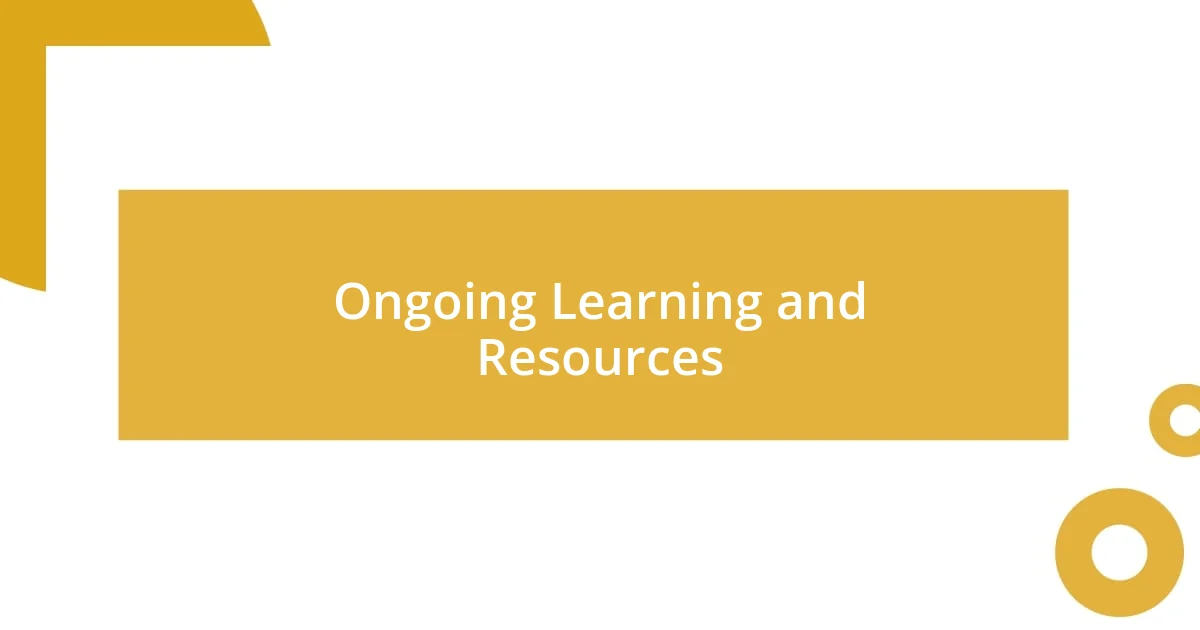
Ongoing Learning and Resources
Throughout my journey after the workshop, I’ve realized that ongoing learning is vital for sustaining the momentum of advocacy. I remember diving into online courses that expanded my understanding of civil rights and social justice. Each lesson felt like a building block, strengthening my foundation to advocate more effectively. Have you ever stumbled upon a resource that unlocked a deeper understanding of a topic? For me, it was discovering webinars and podcasts that not only educated but also inspired me to take more concrete actions in my community.
Additionally, I’ve found that engaging with local organizations can be an incredible resource for continued education. One day, I attended a seminar hosted by a rights advocacy group, and I felt an electric atmosphere. Listening to seasoned activists share their experiences provided insights I couldn’t get from books alone. Those stories, infused with real emotions and struggles, reinforced the importance of staying connected with others in this field. What about you? Have you thought about how collaborative learning can enhance your advocacy efforts?
As I reflect on these experiences, I realize that diversity in resources fuels ongoing growth. Whether it’s joining community forums, participating in virtual discussions, or simply reading relevant articles, each piece contributes to a broader understanding of rights. I recall taking part in a local book club focused on civil rights literature, and the conversations that emerged were nothing short of eye-opening. Isn’t it fascinating how sharing our knowledge can often lead to unexpected connections? Just by remaining curious and engaged, we continuously create pathways for learning that not only benefit us but ripple through our communities.
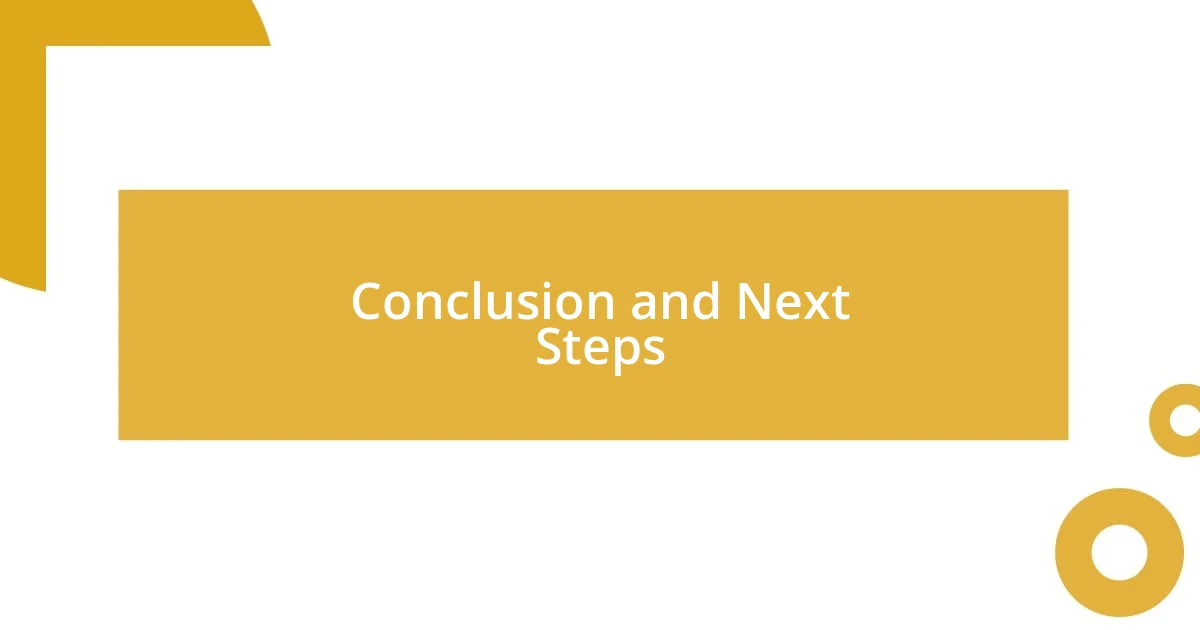
Conclusion and Next Steps
Reflecting on the workshop experience, I’ve realized that the journey doesn’t end with a single event. I remember sitting quietly one evening, contemplating how I could apply the knowledge I gained. It hit me that sharing resources and insights with my circle could spark more enthusiasm for advocacy. Have you thought about how your knowledge could inspire those around you? I’ve found that discussing what I’ve learned helps reinforce my understanding while encouraging others to engage with these vital topics.
Moving forward, I’m committed to building connections and collaborating with like-minded individuals. One memorable instance was when I organized a small community gathering where we exchanged stories and strategies for effective advocacy. The energy in the room was incredible, and it reminded me that collectively, we can create a stronger impact. Can you visualize the power of a united front? Taking the initiative to foster such discussions has become a cornerstone of my approach.
As I look ahead, I know that my ongoing involvement in local organizations will be crucial. I aim to attend more events and workshops while continuing to educate myself and others. It’s not just about personal growth; it’s about lifting each other as we climb. Have you considered how committing to this network of support could enhance your advocacy efforts? Every step taken together cultivates a community rich in resilience and knowledge, which ultimately benefits all of us.









